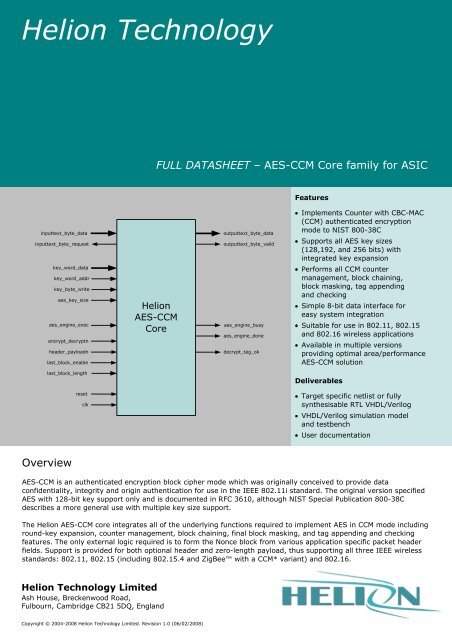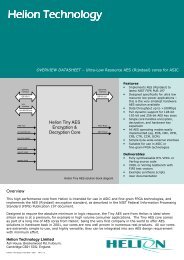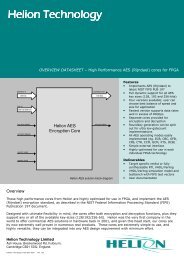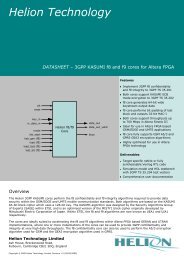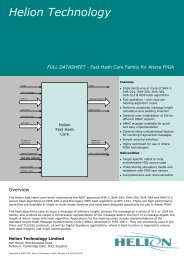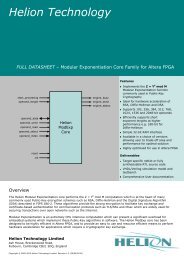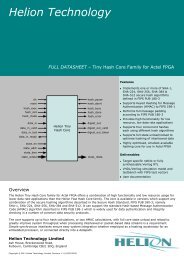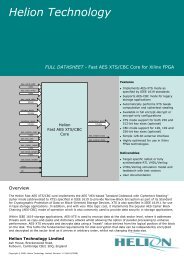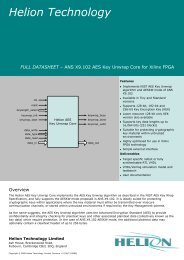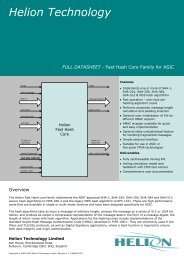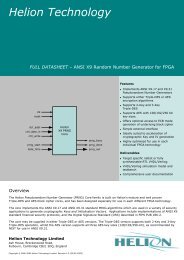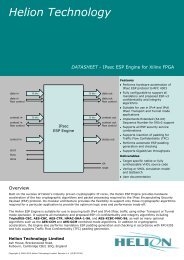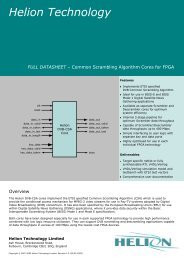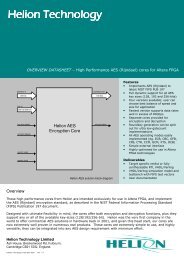AES-CCM ASIC core datasheet - Helion Technology Ltd
AES-CCM ASIC core datasheet - Helion Technology Ltd
AES-CCM ASIC core datasheet - Helion Technology Ltd
You also want an ePaper? Increase the reach of your titles
YUMPU automatically turns print PDFs into web optimized ePapers that Google loves.
<strong>Helion</strong> <strong>Technology</strong><br />
FULL DATASHEET – <strong>AES</strong>-<strong>CCM</strong> Core family for <strong>ASIC</strong><br />
Features<br />
inputtext_byte_data<br />
inputtext_byte_request<br />
key_word_data<br />
key_word_addr<br />
key_byte_write<br />
aes_key_size<br />
aes_engine_exec<br />
encrypt_decryptn<br />
header_payloadn<br />
last_block_enable<br />
<strong>Helion</strong><br />
<strong>AES</strong>-<strong>CCM</strong><br />
Core<br />
outputtext_byte_data<br />
outputtext_byte_valid<br />
aes_engine_busy<br />
aes_engine_done<br />
decrypt_tag_ok<br />
Implements Counter with CBC-MAC<br />
(<strong>CCM</strong>) authenticated encryption<br />
mode to NIST 800-38C<br />
Supports all <strong>AES</strong> key sizes<br />
(128,192, and 256 bits) with<br />
integrated key expansion<br />
Performs all <strong>CCM</strong> counter<br />
management, block chaining,<br />
block masking, tag appending<br />
and checking<br />
Simple 8-bit data interface for<br />
easy system integration<br />
Suitable for use in 802.11, 802.15<br />
and 802.16 wireless applications<br />
Available in multiple versions<br />
providing optimal area/performance<br />
<strong>AES</strong>-<strong>CCM</strong> solution<br />
last_block_length<br />
Deliverables<br />
reset<br />
clk<br />
Target specific netlist or fully<br />
synthesisable RTL VHDL/Verilog<br />
VHDL/Verilog simulation model<br />
and testbench<br />
User documentation<br />
Overview<br />
<strong>AES</strong>-<strong>CCM</strong> is an authenticated encryption block cipher mode which was originally conceived to provide data<br />
confidentiality, integrity and origin authentication for use in the IEEE 802.11i standard. The original version specified<br />
<strong>AES</strong> with 128-bit key support only and is documented in RFC 3610, although NIST Special Publication 800-38C<br />
describes a more general use with multiple key size support.<br />
The <strong>Helion</strong> <strong>AES</strong>-<strong>CCM</strong> <strong>core</strong> integrates all of the underlying functions required to implement <strong>AES</strong> in <strong>CCM</strong> mode including<br />
round-key expansion, counter management, block chaining, final block masking, and tag appending and checking<br />
features. The only external logic required is to form the Nonce block from various application specific packet header<br />
fields. Support is provided for both optional header and zero-length payload, thus supporting all three IEEE wireless<br />
standards: 802.11, 802.15 (including 802.15.4 and ZigBee with a <strong>CCM</strong>* variant) and 802.16.<br />
<strong>Helion</strong> <strong>Technology</strong> Limited<br />
Ash House, Breckenwood Road,<br />
Fulbourn, Cambridge CB21 5DQ, England<br />
Copyright © 2004-2008 <strong>Helion</strong> <strong>Technology</strong> Limited. Revision 1.0 (06/02/2008)
Functional Description<br />
The <strong>Helion</strong> <strong>AES</strong>-<strong>CCM</strong> <strong>core</strong> internally performs two distinct <strong>AES</strong> operations; <strong>AES</strong>-CTR mode to provide data encryption<br />
or decryption, and <strong>AES</strong>-CBC-MAC mode to provide message authentication. Both <strong>AES</strong> operations use the same key<br />
which is loaded into the <strong>core</strong> using the byte-writable 32-bit key interface. Key processing is then initiated by the user<br />
issuing an EXEC_KEY command to the <strong>core</strong> (via aes_engine_exec) and indicating the <strong>AES</strong> key size to be used<br />
(aes_key_size).<br />
Before the start of the message, the Nonce/IV must also be loaded by issuing an EXEC_INIT command to the <strong>core</strong>.<br />
The 128-bit Nonce/IV is transferred into the <strong>core</strong> using the byte-wide data input interface. Message data processing is<br />
performed using multiple 128-bit block encrypt/decrypt operations which are initiated by issuing one or more<br />
EXEC_DATA commands to the <strong>core</strong>. Two control inputs are used to indicate the direction (encrypt_decryptn) and data<br />
type (header_payloadn) of the incoming <strong>CCM</strong> data block. The input block is transferred into the <strong>core</strong> using the bytewide<br />
data input interface (inputtext_byte_data), and the resulting output block is transferred from the <strong>core</strong> using the<br />
byte-wide data output interface (outputtext_byte_data).<br />
The last message block may be less than 128 bits, and so its presence and length in bytes is indicated to the <strong>core</strong><br />
using the last block control inputs. Once the last message block has been encrypted/decrypted, the tag will either be<br />
appended to the output data (encrypt direction), or will be checked against the received tag (decrypt direction) and<br />
the tag check output flag (decrypt_tag_ok) driven accordingly.<br />
Core choice<br />
<strong>Helion</strong> always offer a range of solutions so that the throughput requirements of any application can be closely matched<br />
with optimum area efficiency. In this case, <strong>Helion</strong> have three levels of performance available; we name them to reflect<br />
the nominal number of clock cycles taken to process each 16-byte data block. NOTE. The actual number of cycles taken<br />
by the <strong>core</strong> to process this block varies with exact <strong>core</strong> choice and the keysize selected.<br />
The smallest member of the family is called the “96-cycle”<br />
<strong>AES</strong>-<strong>CCM</strong> <strong>core</strong> which takes a nominal 96-clock cycles to encrypt<br />
or decrypt each 16-byte data block using a 128-bit key.<br />
For higher throughputs, the “48-cycle” <strong>AES</strong>-<strong>CCM</strong> <strong>core</strong> offers<br />
twice the performance of the 96-cycle <strong>core</strong> while using less than<br />
twice its logic area. It takes a nominal 48-clock cycles to encrypt<br />
or decrypt each 16-byte data block using a 128-bit key.<br />
The highest performance member of the family is called the<br />
“24-cycle” <strong>AES</strong>-<strong>CCM</strong> <strong>core</strong>, which offers nominally twice the<br />
performance of the 48-cycle <strong>core</strong> while using less than twice its<br />
logic area. It takes a nominal 24-clock cycles to encrypt or<br />
decrypt each 16-byte data block using a 128-bit key.<br />
Each version of the <strong>core</strong> is available with support for either<br />
128-bit only or all sizes (128, 192 and 256-bit) key support.<br />
PERFORMANCE<br />
96-cycle<br />
<strong>AES</strong>-<strong>CCM</strong><br />
48-cycle<br />
<strong>AES</strong>-<strong>CCM</strong><br />
24-cycle<br />
<strong>AES</strong>-<strong>CCM</strong><br />
version<br />
<strong>AES</strong>-<strong>CCM</strong><br />
24-cycle<br />
<strong>AES</strong>-<strong>CCM</strong><br />
48-cycle<br />
<strong>AES</strong>-<strong>CCM</strong><br />
96-cycle<br />
key option<br />
128 only<br />
Allsizes<br />
128/192/256<br />
128 only<br />
Allsizes<br />
128/192/256<br />
128 only<br />
Allsizes<br />
128/192/256<br />
actual clock cycles<br />
23 28/28/31<br />
48 48/56/64<br />
96 96/112/128<br />
data throughput<br />
(Mbps per MHz)<br />
5.5 4.5/4.5/4.1<br />
2.6 2.6/2.2/2.0<br />
1.3 1.3/1.1/1.0<br />
The tables above show the actual number of cycles plus the resulting data throughput (expressed as Megabits per<br />
second per MHz) for each version of the <strong>AES</strong>-<strong>CCM</strong> <strong>core</strong> and for each key support option.<br />
Note that the two types of 24-cycle <strong>core</strong> are individually optimised to minimise logic area, and so have differing cycle<br />
counts for 128-bit keys. Other options are available if the listed performance above is not appropriate.<br />
For even higher data throughput requirements, <strong>Helion</strong> also have faster<br />
<strong>AES</strong>-<strong>CCM</strong> <strong>core</strong> families which have wider data ports to ensure the<br />
throughput is not constrained by the I/O bandwidth. Please contact <strong>Helion</strong><br />
for more information on these faster <strong>AES</strong>-<strong>CCM</strong> solutions.
Logic Utilisation and Performance<br />
The tables below show the area and performance of the 96-cycle and 48-cycle <strong>AES</strong>-<strong>CCM</strong> <strong>core</strong>s targeting a standard<br />
0.13um CMOS process. The area figures quoted assume a nominal 100MHz clock, though the <strong>core</strong>s will obviously run at<br />
much higher rates if required. For more information on these or our faster <strong>core</strong> variants, please contact <strong>Helion</strong>.<br />
<strong>AES</strong>-<strong>CCM</strong> 96-cycle <strong>core</strong><br />
<strong>AES</strong>-<strong>CCM</strong> 48-cycle <strong>core</strong><br />
128-bit key version<br />
Allsizes key version<br />
128-bit key version<br />
Allsizes key version<br />
technology<br />
0.13um<br />
0.13um<br />
0.13um<br />
0.13um<br />
logic resource<br />
< 14k gates<br />
< 16.5k gates<br />
< 19k gates<br />
< 21.5k gates<br />
max clock<br />
> 300 MHz<br />
> 300 MHz<br />
> 300 MHz<br />
> 300 MHz<br />
max throughput<br />
128-bit key<br />
> 400 Mbps<br />
> 400 Mbps<br />
> 800 Mbps<br />
> 800 Mbps<br />
max throughput<br />
192-bit key<br />
-<br />
> 340 Mbps<br />
-<br />
> 680 Mbps<br />
max throughput<br />
256-bit key<br />
-<br />
> 300 Mbps<br />
-<br />
> 600 Mbps<br />
About <strong>Helion</strong><br />
Founded in 1992, <strong>Helion</strong> is a well established British company based in Cambridge, England, offering a range of<br />
product-proven Data Security IP <strong>core</strong>s backed up by highly experienced and professional design service capabilities.<br />
Although we specialise in providing the highest performance data encryption and authentication IP, our interest does<br />
not stop there. Unlike broadline IP vendors who try to supply a very diverse range of solutions, being specialists we<br />
can offer much more than just the IP <strong>core</strong>.<br />
For instance, we are pleased to be able to supply up-front expert advice on any security applications which might take<br />
advantage of our technology. Many of our customers are adding data security into their existing systems for the first<br />
time, and are looking for a little assistance with how best to achieve this. We are pleased to help with suitable advice<br />
and support where necessary, and pride ourselves in our highly personal approach.<br />
In addition, our Design Services team have an impressive track record in the development of real security products<br />
for our customers; we are proud to have been involved in the design of numerous highly acclaimed security products.<br />
This knowledge and experience is fed back into our IP <strong>core</strong>s, to ensure that they are easy to integrate into real<br />
systems, and perform appropriately for real engineering applications.<br />
Unlike many broadline IP <strong>core</strong> vendors, <strong>Helion</strong> also spends a great deal of effort designing its <strong>core</strong>s at the very lowest<br />
level. We strongly believe that if you are buying IP, it should have been designed with the ultimate in care, and<br />
crafted to achieve the desired performance; not just put together at a high level to get the job done quickly. We find<br />
that this approach pushes the results much closer to the intended performance envelope.<br />
For instance, if we are aiming for speed, we carefully optimise the datapath delays right down at the gate level; the<br />
result is a significantly faster <strong>core</strong>. Similarly, if we are aiming at reducing the gate count, we maintain a detailed<br />
understanding of gate budget throughout the design process. The benefits of this approach to design can be clearly<br />
demonstrated by direct comparison between <strong>Helion</strong> Data Security IP <strong>core</strong>s and the equivalents from other vendors.<br />
More Information<br />
For more detailed information on this or any of our other products and services, please contact <strong>Helion</strong> and we will be<br />
pleased to discuss how we can assist with your individual requirements.<br />
<strong>Helion</strong> <strong>Technology</strong> Limited<br />
Ash House, Breckenwood Road,<br />
Fulbourn, Cambridge CB21 5DQ, England<br />
tel: +44 (0)1223 500 924<br />
fax: +44 (0)1223 500 923<br />
email: info@heliontech.com<br />
web: www.heliontech.com<br />
Copyright © 2004-2008 <strong>Helion</strong> <strong>Technology</strong> <strong>Ltd</strong>; All rights reserved. This document contains Proprietary Trade Secrets of <strong>Helion</strong> <strong>Technology</strong> Limited; its receipt or possession<br />
does not convey any right to reproduce, disclose its contents, or to use its contents to manufacture, use, or sell anything that it may describe without the written authorisation<br />
of <strong>Helion</strong> <strong>Technology</strong> Limited. The products described in this document are subject to continuous development and all information is supplied strictly "as is" with no warranties<br />
implied or expressed and <strong>Helion</strong> <strong>Technology</strong> Limited shall not be liable for any loss or damage arising from the use of any information contained in this document.<br />
ZigBee is a trademark of The ZigBee Alliance.


